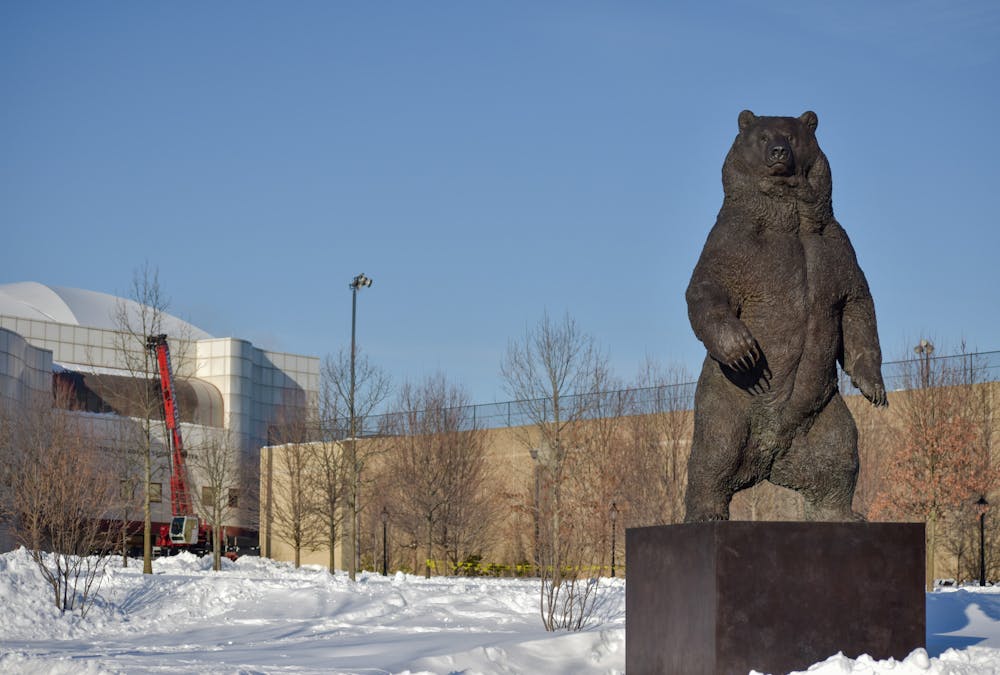A class action lawsuit filed Tuesday by current and former Brown basketball players Grace Kirk ’24 and Tamenang Choh ’21 MPA’22 alleges that Ivy League schools violate antitrust laws by denying student athletes athletic scholarships and compensation for their services.
The lawsuit claims that the alleged price-fixing “Ivy League Agreement” has “anticompetitive effects, raising the net price of education that Ivy League athletes pay and suppressing compensation for the athletic services they provide to the University Defendants.”
According to Michael McCann, director of the Sports and Entertainment Law Institute at the University of New Hampshire, the plaintiffs’ argument is that “while Ivy League schools compete (with each other) in numerous ways, such as in pursuit of top faculty, grants or media attention,” they agree to not compete when recruiting college athletes by failing to offer specific scholarships and reimbursements for education expenses.
According to the complaint, this violates the Sherman Antitrust Act of 1890, which protects “trade and commerce against unlawful restraints and monopolies.” The Sherman Act “prohibits competing businesses, including colleges, from colluding in ways that harm competition,” McCann wrote in an email to The Herald.
The lawsuit builds on the 2021 National Collegiate Athletic Association v. Alston Supreme Court case, which ruled that colleges that “join hands to prevent any individual college from paying their athletes for education-related expenses” violate antitrust law, McCann wrote.
“The restrictions on price competition that lie at the heart of this case are analogous to other restrictions on collegiate athletes’ compensation that the Supreme Court unanimously struck down in Alston,” the complaint reads.
The plaintiffs are being represented by a team including Robert Litan from Berger Montague, a pioneering class action law firm. In 2021, Litan wrote an article for The New Republic claiming that the Ivy League has been allowed to operate like a “monopoly,” which disproportionately harms potential student athletes who are students of color.
“Congress and the executive branch have allowed the eight colleges belonging to the Ivy League to circumvent antitrust laws by apparently agreeing to limit the amount of aid deserving students can receive,” he wrote.
McCann believes one possible defense from the Ivy League will be that student athletes “are not a ‘market’ for purposes of antitrust scrutiny — namely, athletes who might go to Harvard or Dartmouth can instead go to other academically elite colleges with similar sports profiles where athletic scholarships are offered,” he wrote.
McCann also highlighted how the lawsuit will likely not impact the schools' individual decisions on whether to offer athletic scholarships. “If Brown on its own, or Yale on its own, didn’t want to give athletic scholarships to their athletes, that is fine under antitrust law,” he wrote. “The problem is when two or more colleges … agree to not give scholarships.”
As it stands, “the complaint has no merit,” University Spokesperson Brian Clark wrote in an email to The Herald. “Brown’s undergraduate financial aid program is (one of) the most robust among all U.S. colleges and universities, and meets 100% of each Brown undergraduate’s demonstrated financial need.”
“If (the University is) served with this complaint directly, we will conduct a full review and respond as appropriate through the legal process,” he added.
While McCann believes it is too early to draw conclusions, he wrote that “the case makes plausible and seemingly persuasive arguments.”
The plaintiffs’ are seeking treble damages for all class members, including current and former Ivy League athletes recruited since March 2019, beyond any relief deemed necessary by the Court.
The complaint also instates “a permanent injunction” prohibiting the Ivy League to continue its alleged agreement or engage in “any equivalent horizontal agreement, combination or conspiracy.”
Clarification: This article has been updated with changes to quotations.

Julia Vaz was the managing editor of newsroom and vice president on The Herald's 134th Editorial Board. Previously, she covered environment and crime & justice as a Metro editor. A concentrator in political science and modern culture and media, she loves watching Twilight (as a comedy) and casually dropping the fact she is from Brazil.





